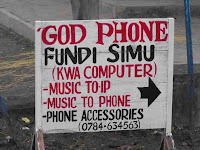 The gift of a cow.
The gift of a cow.Last Sunday we ventured into new territory again. Our hostess for the day was one of the teachers from Shukrani and we attended a nearby Moravian church in Mbeya. The Moravians are strong is this area - and we have to learn a little more about their history and doctrines, but understand them to be similar in many ways to the Lutheran church.
It was the second service that we were to attend, and we had to wait just a few minutes before we were able to enter. Our chosen seat was just behind the choir in the section of the church facing the pulpit. Two 'wings' extended right and left of the raised platform in front of us, and each had a capacity of at least 150 persons. Very early in the service we were invited to move to a more prominent position, and later in the service were 'formally' introduced and asked to greet the church.
The singing commenced before the worship leader or the preacher arrived. The tune was familiar, but not the words, so we sang in English "What can wash away my sins, nothing but the blood of Jesus". It was one of only two songs that were familiar to us. There were elements of liturgy in the service, and the three choirs all contributed. Readings were taken from Old Testament (Exodus and Psalms) and from the New Testament (Gospels and Epistles) - four in all.
One of the interesting background noises was a cow periodically moo-ing in the background. It seemed unusual, as we were only a couple of kilometres from the centre of Mbeya, but there are quite a number of cows that are tethered in streets and lanes. During the notices there were two unusual announcements. The first was to turn off your mobile phone - with the added advice that "If you did not know how then someone hear to you would be able to help you!" The second was that as a thanksgiving offering a family had given a cow to the church. They were thankful that their children had passed form 4 and form 6. This is a very significant gift, worth many months' wages for an average employee. A very generous gift indeed.

There were two offerings during the service - the regular tithes, and a thanksgiving offering. At the end of the service there was a short auction of goods people had brought instead of money. The money was then put in their giving envelope. (Envelopes are reused, and people received a receipt for their previous offering when they got the envelope back.)
Once again we enjoyed the music, and the privilege of worship. We were the only white people there, we didn't understand much of what was said (our hostess translated for us), yet it was great to share in worship and praise to God.





